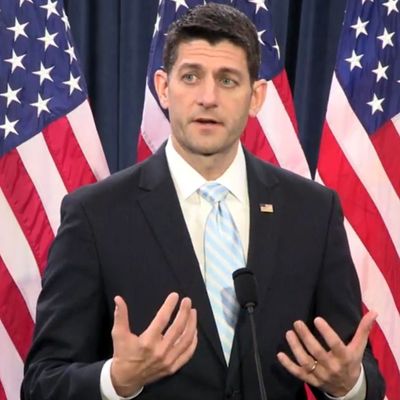
In 1884, Republicans desperate to hold on to the White House turned to William Tecumseh Sherman, the heroic Civil War general. Sherman’s reply — “I will not accept if nominated and will not serve if elected” — has attained a fame nearly equal to that of his military feats, in part because historical memory has reworded it in more poetic form (“If nominated, I will not run; if elected, I will not serve”). If Paul Ryan does not want the Republican nomination, he will make what we call a “Shermanesque statement.” Despite numerous opportunities, he has failed to do so. The most plausible explanation for this is that Ryan does, in fact, covet the nomination.
One of the things that has made Sherman’s disavowal of the presidency so famous is its redundant comprehensiveness, insisting he would not take his party’s nomination even if it were handed to him. In modern presidential politics, the scenario Sherman ruled out — gaining the nomination without lifting a finger — has become an anachronism. Winning the nomination requires a massive campaign operation. But this year’s Republican contest may break from the historic norm. A contested convention is possible, and this could result in the nomination of somebody who has not campaigned. The most likely scenario is that Donald Trump locks down a majority of delegates and wins the nomination before the Republican convention. Failing that, it is fairly likely that Ted Cruz — who, virtually alone, is feverishly organizing the state conventions where delegates are selected — wins on a succeeding ballot. (Once delegates are released from their pledge to support the nominee chosen by their state’s voters, they can vote their conscience, and Cruz is making sure as many of them as possible conscientiously desire his nomination.) If Trump fails to win a majority of the formal commitments of bound delegates, and Cruz also fails to organize a majority on succeeding ballots, then the convention faces a deadlock at which any number of possibilities would open up.
Republican elites fervently, desperately hope that this scenario would lead to Ryan securing the nomination. It is hard to think of a more natural fit to rescue them. If the United States had a parliamentary system, Ryan would be the Republican leader. No other figure combines the roles of public communicator and chief ideologist in quite the same way. Asked about such an instance by John Harwood, Ryan all but said he would take the job. (“You know, I haven’t given any thought to this stuff. People say, ‘What about the contested convention?’ I say, well, there are a lot of people running for president. We’ll see. Who knows?”) He has since played it a bit more coy. Begged by conservative talk-show host Hugh Hewitt to save the party, Ryan demurred:
I do believe people put my name in this thing, and I say get my name out of that. This is, if you want to be president, you should go run for president. And that’s just the way I see it … I think you need to run for president if you’re going to be president, and I’m not running for president. So period, end of story.
This statement is being reported as a firm denial of interest, but it should be understood in context. Ryan’s history is to acquire a reputation as lacking ambition even as he rockets up the ranks. His repeated denials of interest in serving as Speaker of the House were, in retrospect, merely a negotiation over the terms under which he’d accept the job. (The rebellious House Freedom Caucus, the counterparty to the negotiation, turned down Ryan’s demands. He accepted the job anyway.)
What’s more, the scenario under which Ryan would get the nomination is one in which the party has denied it to the candidate who received the most primary votes and to the candidate who received the second-most. The party’s primary task would be to defuse their rage and sense of betrayal. Ryan has positioned himself perfectly for this role. He has reached out to Trump privately, and even his speech calling for elevated public discourse declined to name its obvious target. Trump antagonists like Ross Douthat have flayed Ryan’s timidity, but Ryan is positioning himself as a peacemaker between the Trump and anti-Trump factions.
Sometimes politicians have reasons to stoke presidential speculation without having an intention to run. Maybe they’re gauging potential interest, or maybe they’re looking to attract media attention to elevate their profile. Ryan has no such motivation. If he wanted to rule out getting the nomination at the convention, he could simply state he wouldn’t accept it. He hasn’t.






























